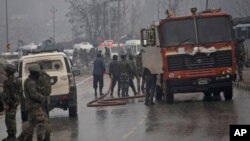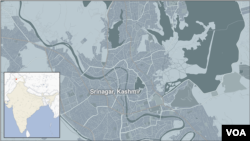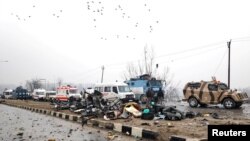At least 40 paramilitary soldiers were killed Thursday in Indian Kashmir when a bomber rammed a vehicle laden with explosives into a convoy.
The attack, the deadliest targeting security personnel in Kashmir, occurred as a convoy of 70 vehicles traveled on a main highway near Kashmir’s summer capital, Srinagar.
The assault is likely to inflame tensions with India’s archrival Pakistan, which New Delhi accuses of sheltering and supporting militants that carry out violence in Kashmir.
Jaish-e-Mohammad takes responsibility
Within hours of the attack, India blamed the attack on the Pakistan-based Islamist Jaish-e-Mohammad group.
Pakistan condemned the attack as a matter of grave concern and called on India to investigate it before pointing fingers at Islamabad.
“We strongly reject any insinuation by elements in the Indian government and media circles that seek to link the attack to the state of Pakistan without investigations,” the foreign ministry said.
The Jaish-e-Mohammad group, which took responsibility for the attack in a statement sent to a local news agency, said a locally recruited fighter had carried out the suicide bombing.
The brunt of the attack was borne by one bus that had about 44 personnel on board, but the massive force of the explosion also impacted other vehicles in the convoy, in which hundreds of paramilitary personnel were traveling.
Sanjay Sharma, a spokesman for the Central Reserve Police Force whose convoy was targeted, called it a “very powerful explosion” and said the bus had been completely shredded. Video showed twisted remains of charred metal. Witnesses said the explosion was heard several miles away.
First car bomb
The toll could rise because several soldiers are critically injured, according to officials.
Thursday’s attack is the first using a car bomb in nearly two decades. Most militant attacks in Kashmir are carried out by gunmen.
Prime Minister Narendra Modi called the attack “despicable.” In a tweet, he said, “I strongly condemn this dastardly attack. The sacrifices of our brave security personnel shall not go in vain.”
In a statement, the foreign ministry demanded that “Pakistan stop supporting terrorists and terror groups operating from their territory.” It said the government is “firmly and resolutely committed to taking all measures to safeguard national security.”
Indian officials appealed to the international community to support the proposal to list the radical cleric who heads the Jaish-e-Mohammed, Maulana Massod Azhar, as a designated terrorist. The move is backed by the United States and other countries, but blocked by China.
2016 attack
The attack was deadlier than one in 2016 that killed 19 soldiers, when four heavily armed terrorists raided an army camp in Kashmir. Relations between India and Pakistan had plummeted in the wake of that attack. New Delhi had said it carried out strikes in Pakistani territory to take out militant camps.
The governor of Jammu and Kashmir state, Satya Pal Malik, said Thursday’s attack seems to be “guided from across the border,” a reference to Pakistan.
The Muslim-majority region of Kashmir is divided between India and Pakistan and claimed by both. Militant groups fighting in the region either want the territory’s independence or its merger with Pakistan.
Analysts said that the latest attack will put pressure on Modi, who faces elections in less than two months, to take a tough stand against Pakistan.






